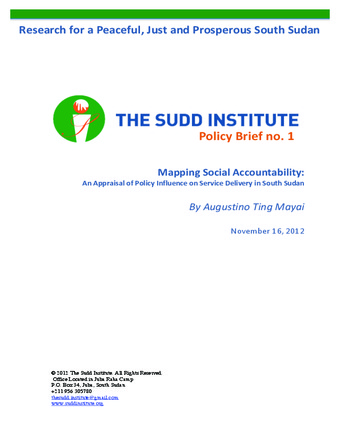Mapping Social Accountability: An Appraisal of Policy Influence on Service Delivery in South Sudan, 2006-2011
Publication Summary
How might less-informed policy-making lead to social injustice? How do the Government of South Sudan's budgeting decisions impact the delivery of security, health services, and education at the local level?
This study analyzes institutional data, including government’s approved budgets, educational enrollments, health conditions and mortality rates, in order to map how social accountability and service delivery efforts relate to policy decisions in South Sudan.
- Except for the security sector, health/water, education, and production have not received adequate funding as the government promised in its core expenditure priorities.
- Several years later, the country’s health conditions remain poor due to low funding, with sharp state differences; though there seems to be more funding in the security sector, insecurity has high-rocketed in some states; literacy and school enrollment rates are relatively low.
- States’ population sizes and needs differ considerably; yet, GoSS’ financial disbursements have not systematically corresponded to such differences among state populations presumably due to little implementation of existing goals and lack of policy guidance.
- More service-oriented GoSS institutions lag behind their policy-oriented counterparts in average spending.
- Though the disbursements have more or less increased over the years since 2006, states’ average approved budget was as low as 12.6 percent of the total national budget in 2008, with an average spending of 16 percent. Overall, this means that for every $1 increase in state expenditure GoSS spends additional $4, averaging at $0.87(+0.15 or -0.15) for every dollar the nation earns in oil revenue.
- The assessment suggests stark policy analysis gaps in the GoSS’ calculus of proportionate budgeting, a situation that may result in systemic social imbalances in an-already impoverished society, and which may potentially invoke resource-based tensions across distinct social groups.
- These results invoke policy suggestions, including the need to recognize the importance of population-specific experiences in public resource allocation exercise, all with the aim to ensure social equity, promote peace and stability in the population, and to focus more attention on states and service oriented institutions’ fiscal needs.
Augustino Ting Mayai's Biography
Augustino Ting Mayai is the former Managing Director of the Sudd Institute. He is a founding Research Director of the same institution, serving in this capacity for a decade. He holds a Ph.D. in Sociology, with concentrations on demography and development from the University of Wisconsin-Madison. He currently studies how state effectiveness affects child health outcomes in South Sudan and Ethiopia. Dr. Mayai has written extensively on South Sudan’s current affairs. August is the current Chair (Statistician General) of the National Bureau of Statistics, Government of South Sudan.

